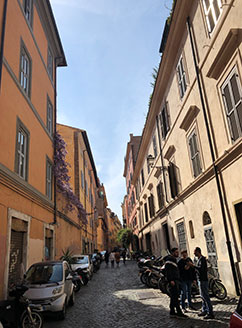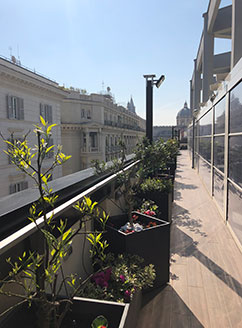Up in the air
The technology behind global e-rental service Airbnb is transforming the accommodation and tourism industry in Italy. As regulators struggle to keep up, Harveen uncovers what in-house teams are doing to assist, while ensuring their businesses remain running.
Travelling to Rome from Milan, it is easy to see why the tourism industry is booming. Worth billions of dollars, it provides a crucial boost to the Italian economy. Capitalising on the influx of travellers is billion dollar company Airbnb. In just over a decade, this once humble start-up has revolutionised the accommodation industry by pioneering an online home sharing service. The e-rental platform has been used over half a billion times and operates in over 191 countries.
In a plush office in Milan, I sat down with Matteo Frigerio, country manager and senior counsel at Airbnb Italy. Discussing all things legal, GC magazine discovers how his team combats challenges arising from a legal framework that is yet to catch up with advancing technology. Frigerio explains how Airbnb operates within both regional and national government regulations, recommends policy improvements and comments on tourist tax.
HOME SWEET HOME
Unlike most European countries, a significant amount of Italians invest in residential property.
‘In Italy, I think it is quite a unique market in terms of how people are close to the idea of home, private property and housing. Eight people out of ten in Italy own their own home, their primary home or a property,’ says Frigerio.
The popularity of Italy as a travel destination, coupled with high homeownership rates have propelled Airbnb to the top of the ‘most rooms to rent’ list. Frigerio proudly reveals that there are currently more than 400,000 homes available to rent in Italy, making it the third most popular destination market.
Yet, home sharing on this scale can be legally problematic. Lawmakers are at odds regarding how to legally classify this open platform. Not fitting into the legal frame work governing hotels or rental properties, the early lawyers at Airbnb were crucial. At the beginning there was ‘a lot of firefighting,’ Fregerio reveals.
‘So, when I joined three years ago, the legal counsel that came before me, they really had done the heavy lifting. Now, we are really recognized by the business partners as absolutely fundamental advisors. So, I don’t see anything happening without involving legal, which is part of my story as legal counsel.’
Fregerio and the work his legal team does has evolved over time. Now operating as a strategic business leader, he partners with Italian regulatory bodies to develop legal frameworks that cater to technology surrounding the e-rental market.
GROWING PAINS
The legal framework surrounding Airbnb Italy is a classic tale, one in which laws are unable to keep up with the advancement of new technology. The home sharing platform has changed the way in which travellers search, rent and pay for accommodation. But being the first hosting website of its kind, has come with a few legal drawbacks.
‘We have some outdated laws that are specifically impacting rentals. These are difficult to match with the new economy and new technology that is impacting tourism today,’ says Frigerio.
‘So, we work closely with our government relations team, who actually engage directly with policymakers and try to understand really what they want to achieve with new laws.
‘Respecting the autonomy of public administrations, we are not a company that dictates anything…but some policymakers actually have been seeking our opinion on some of the laws.’
One of the major legal challenges that remains at the forefront are the varying laws between the national government and regional regulatory bodies. Frigerio describes how these variations can be particularly difficult for hosts that own multiple homes in different regions. For example, if you own a home in Milan and a home in Rome you will need to abide by regulations from two different jurisdictions. Frigerio describes this issue as being uniquely Italian.
‘So our job is really the one to make the authorities and the government aware of this gap and try and be available to either provide some suggestions or even escalate the issue, and then let the government and the regulator do their job and craft policies that make sense for the people.’
‘We have seen some sign of evolution in that respect of some regions, for example, regulating home sharing in a way that makes sense for host and citizens.’
Yet, with no easy fix on the horizon, deciphering between national and regional regulations is a continuous process for the in-house legal team at Airbnb Italy.
Also key to developing a legal framework that encompasses technological advancements are relationships. Frigerio asserts that ‘unleashing the ability for people to use their property in Italy is absolutely fundamental and politicians do understand that.’
In some situations, Airbnb have been able to work with regulatory bodies to establish a new legal framework.
‘We’ve been very lucky in having good relationship, for example, with Liguria, that’s a region in North West of Italy.’
Frigerio explains that by partnering with Airbnb Italy, this tourist hotspot crafted laws that were to the benefit of both homeowners and citizens. By modifying the red tape to include accommodation hosting services, residents were easily able to register their property and operate a room rental service, within an established legal framework.
TOURSIM TAX
In 2011, the Italian government introduced a taxation system that gave regional regulatory bodies the authority to bring in a tourist tax.
‘Airbnb is very active, in assisting cities with collecting tourist tax,’ says Frigerio. ‘So what we do, is we use technology to make sure that every guest that books accommodation pays tourist tax at the time of the booking and therefore we ensure that 100% is collected when a booking happens on Airbnb. We have been doing that in, 20 cities – the 20 biggest cities in Italy now work with us on, this tax collection’.
Working together with regional regulatory bodies has allowed Airbnb to become more innovative. For example, Fregerio explains, in the city of Palermo, Airbnb reinvests 10% of all tax collected into a participative budget. Citizens get to vote on how that money is invested back into the city.
‘It’s a process that puts the citizen at the core of the policy making,’ says Frigerio, ‘that’s an example of what we can really do to be a partner of the public administration.’
AIRBNB VS HOTELS
We cannot talk about Airbnb without discussing simmering tensions between hotels and home stay lodging. As Airbnb continues to grow, so does the increased competition within the accommodation market. But this is not a negative, according to Frigerio.
‘Airbnb starts its mission with a completely different objective than competing with hotels.’
Fregerio says, different travellers have different needs and a person wanting to stay in a hotel will not have the same needs as a person wanting stay in an Airbnb.
‘Even myself, if I think about different kinds of travel that I take, if I travel with my kids, or I travel with a friend or even if I travel with my wife – I would probably decide to choose a different type of accommodation each time. That is pretty true for everybody.’
However, Fregerio acknowledges that not everyone feels this way, with increased competition comes resistance from hotel lobby groups that continue to advocate against Airbnb on the basis of alleged unfair competition.
As a result, Airbnb Italy has met some resistance from regulatory bodies: ‘There is an element of following that narrative without looking at the numbers and the numbers say that there is room for everyone.’
According to Frigerio the numbers show, ‘the success of home hosts in Italy are particularly relevant when hotels are successful.’
Looking specifically at the numbers for Design Week in Milan, one of the busiest times of the year, Frigerio says that although bookings were up for Airbnb, hotel bookings were even higher. Nevertheless, the success the e-rental company has not only rattled the hotel market in Italy, but around the world. As laws continue to evolve to cater to this new technology, Airbnb is showing no signs of slowing down; the company is expected to go public later this year.
FUTURE BOOKINGS
Over the last three years, the legal team at Airbnb has doubled in size. With more projects on the horizon, Fregerio reveals that ‘the conversation we are having right now with central government is to introduce a national registration system for homes that are being listed on Airbnb.’
Working with the regulatory bodies, Frigerio and his legal team have proposed that the register be free, online and efficient. ‘The proposal that we have made to the government publicly is actually to make a one-stop-shop.’ Keeping processes clear and simple remains one of the core goals for the company.
The future is looking bright for Airbnb, with plans to one day become an end to end travel service. Although the legal framework surrounding its services have developed slowly, Frigerio says, tourism is being viewed as a resource rather than something to be constrained.



